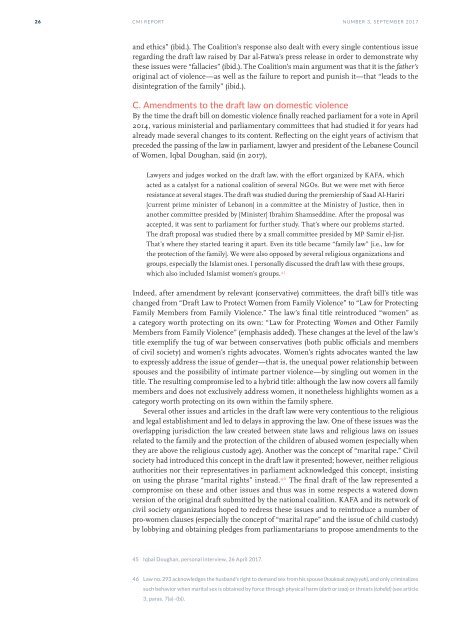WOMEN RIGHTS IN LIBANESE EPUBLIC
ARTICLES ABOUT WOMEN RIGHTS AT LIBANO. SPECIAL MENTION FOR JUDGE ELIAS RICHA.
ARTICLES ABOUT WOMEN RIGHTS AT LIBANO. SPECIAL MENTION FOR JUDGE ELIAS RICHA.
Create successful ePaper yourself
Turn your PDF publications into a flip-book with our unique Google optimized e-Paper software.
26 CMI REPORT NUMBER 3, SEPTEMBER 2017<br />
and ethics” (ibid.). The Coalition’s response also dealt with every single contentious issue<br />
regarding the draft law raised by Dar al-Fatwa’s press release in order to demonstrate why<br />
these issues were “fallacies” (ibid.). The Coalition’s main argument was that it is the father’s<br />
original act of violence—as well as the failure to report and punish it—that “leads to the<br />
disintegration of the family” (ibid.).<br />
C. Amendments to the draft law on domestic violence<br />
By the time the draft bill on domestic violence finally reached parliament for a vote in April<br />
2014, various ministerial and parliamentary committees that had studied it for years had<br />
already made several changes to its content. Reflecting on the eight years of activism that<br />
preceded the passing of the law in parliament, lawyer and president of the Lebanese Council<br />
of Women, Iqbal Doughan, said (in 2017),<br />
Lawyers and judges worked on the draft law, with the effort organized by KAFA, which<br />
acted as a catalyst for a national coalition of several NGOs. But we were met with fierce<br />
resistance at several stages. The draft was studied during the premiership of Saad Al-Hariri<br />
[current prime minister of Lebanon] in a committee at the Ministry of Justice, then in<br />
another committee presided by [Minister] Ibrahim Shamseddine. After the proposal was<br />
accepted, it was sent to parliament for further study. That’s where our problems started.<br />
The draft proposal was studied there by a small committee presided by MP Samir el-Jisr.<br />
That’s where they started tearing it apart. Even its title became “family law” [i.e., law for<br />
the protection of the family]. We were also opposed by several religious organizations and<br />
groups, especially the Islamist ones. I personally discussed the draft law with these groups,<br />
which also included Islamist women’s groups. 45<br />
Indeed, after amendment by relevant (conservative) committees, the draft bill’s title was<br />
changed from “Draft Law to Protect Women from Family Violence” to “Law for Protecting<br />
Family Members from Family Violence.” The law’s final title reintroduced “women” as<br />
a category worth protecting on its own: “Law for Protecting Women and Other Family<br />
Members from Family Violence” (emphasis added). These changes at the level of the law’s<br />
title exemplify the tug of war between conservatives (both public officials and members<br />
of civil society) and women’s rights advocates. Women’s rights advocates wanted the law<br />
to expressly address the issue of gender—that is, the unequal power relationship between<br />
spouses and the possibility of intimate partner violence—by singling out women in the<br />
title. The resulting compromise led to a hybrid title: although the law now covers all family<br />
members and does not exclusively address women, it nonetheless highlights women as a<br />
category worth protecting on its own within the family sphere.<br />
Several other issues and articles in the draft law were very contentious to the religious<br />
and legal establishment and led to delays in approving the law. One of these issues was the<br />
overlapping jurisdiction the law created between state laws and religious laws on issues<br />
related to the family and the protection of the children of abused women (especially when<br />
they are above the religious custody age). Another was the concept of “marital rape.” Civil<br />
society had introduced this concept in the draft law it presented; however, neither religious<br />
authorities nor their representatives in parliament acknowledged this concept, insisting<br />
on using the phrase “marital rights” instead. 46 The final draft of the law represented a<br />
compromise on these and other issues and thus was in some respects a watered down<br />
version of the original draft submitted by the national coalition. KAFA and its network of<br />
civil society organizations hoped to redress these issues and to reintroduce a number of<br />
pro-women clauses (especially the concept of “marital rape” and the issue of child custody)<br />
by lobbying and obtaining pledges from parliamentarians to propose amendments to the<br />
45 Iqbal Doughan, personal interview, 26 April 2017.<br />
46 Law no. 293 acknowledges the husband’s right to demand sex from his spouse (houkouk zawjyyah), and only criminalizes<br />
such behavior when marital sex is obtained by force through physical harm (darb or izaa) or threats (tahdid) (see article<br />
3, paras. 7(a)–(b)).



